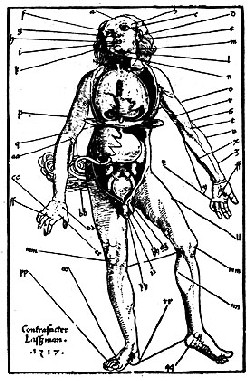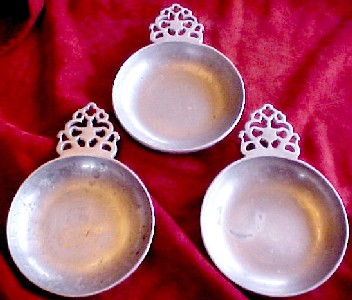
Bloodletting Procedure Page Menu: 1 2 3 4 Next>>
Bloodletting Procedure During the Golden Age of Piracy, Page 2
The Qualities of an Effective Surgeon for the Operation

A Bloodletting Chart, 1517
Hans Van Gersdorff, Feldtbüch der wundartzney
"We bleed at several Parts of the Body, the Head, the Neck, the Arms and the Feet. I have already shewn you
all the Bleedings practis'd on the Head and Neck [not shown], and at present shall proceed to demonstrate
those usually performed on the Arms [the most common type of bleeding]..." (Dionis, p. 363)
"…but he who pretends to excel in the Art of Phlebotomy, ought to be stor'd with the Qualities generally requisite in all those of his Possession. His Person must be agreeable, that he may not disgust his Patients, he must have Wit to perswade what he urges, an exact and piercing Sight to distinguish the least Objects, so that he must not have any Weakness in his Eyes, or be pur-blind or near-sighted; he must not have a large Hand, for that would be too heavy, but rather long slender Fingers, whose Skin is to be white and fine, that his Sense of touching may be the nicer; he must not be addicted to Drinking, lest being called when overtaken in Wine, he should be obliged to perform a difficult Bleeding; nor ought he ever to draw Teeth, knock in Nails, cleave Wood, play at Tennis or Bowls, by reason that all these Exercises tend to the spoiling of his Hand: To conclude, he is to have great regard to the Preservation of his Hand, if he would bleed well, and continue long so to do.
'Tis not enough for the Chirurgeon to have a good Eye and steady Hand, but he must be furnished with good Instruments, in order to bleed without Pain. The Choice of Lancets does not a little contribute to bleeding well; whenever they are the least blunt, or the Edge rough, we are to send them to the Cutler, we are never to spare on this Head, for let the Chirurgeon's Hand be never so light, with an ill Lancet he will put the Patient to Pain." (Dionis, p. 363)
"The Phlebotomist, endu'd with the Qualities which I have already pointed out, and provided with good Lancets, ought also to take care that they be of different Length and Breadth, to serve to apply to the different Veins which he is to open....
When Bleeding is prescribed by a Physician, there is not room left for the Chirurgeon's Examination, but he is immediately to prepare for this Operation; but if it be ordered by the Patient himself, he is to inform himself of the Reasons which engaged him to desire to be bled, and to see whether he is in a State to undergo that Operation; for if just come from a plentiful Meal, or has not in a long Time taken any Nouriture, if in a cold or hot Fit of a Fever, or in a Sweat at the Expiration of it, when he has just voided his Excrements, when in a Passion when cold, or when he has committed any other Excess, these are all of them Reasons for deferring Bleeding. But if there is nothing in the way which ought to hinder it, the Chirurgeon must then prepare all Things necessary." (Dionis, p. 364)
I think it is interesting to note that he mentions the patient would ask to be bled. It reminds me of people I know who don't believe they've had a successful visit to the doctor if they haven't come away with a prescription.
Preparing to Let Blood
"The Chirurgeon is then to begin with causing to be lighted his Wax, or Tallow Candle, the latter of which is by some preferred to the former, because (say they) any Wax should happen to drop on the Arm, it would occasion more Pain than Tallow…
An End of a Wax Taper is more commodious than a whole one, which by reason of its Length we cannot place where we please. The Wick of this Wax Candle must be indifferent thick, to give the greater Light, the thickest winding Wax Candle is hotter than the stiff or straight sort, because we can bend and fold it at pleasure.
We are then to prepare a Band of Cloth, neither too new, nor too much used, of an Inch Breadth, and an Ell and half long, to each Extremity of which I approve the sewing of a small End of Tape. As I have seen in the Nunneries in Flanders, as I was bleeding there; this is convenient to tye the Knot, which by this Means becomes less than when done with the Fillet. We then prepare two Bolsters [cloth bandages] of an Inch square, of Linen folded ten or twelve time double, that they may be thick enough to press down the Vein; we prepare two, that in case the blood comes to escape out, we may always have a second ready. The Ligature [a thin strand of long material] is neither to be of Lift nor Hemp, the latter being very inconvenient, not binding the Bolster hard enough, and the Lifts putting tender Arms to Pain.

Mission's three porringers for bleeding
We then place three Porrengers [bowls] on three several Plates, for should they all be set in one, they could not
stand even, and consequently could not well be filled. We prepare three, tho' we intend to use but two,
because the Blood sometimes comes out so freely, that we find it proper to go as far as the third Porrenger. These
Porrengers have each a small Ear to hold by on Occasion, and they are to hold three Ounces each, that we may know
exactly the Quantity of Blood which we draw." (Dionis, p. 364-5)
"We then call for Water, with which we fill a Glass, we cause to be got ready Vinegar or Hungary-water, if the Patient is apprehensive or Swooning. We cause the Patient to approach the edge of the Bed, which is on that side of the Arm we are to bleed, next we lay a Cushion or Pillow behind him, to bolster him up, and keep him sitting, and cover the Bed with a Cloth, to receive the Blood when it first flies out after Aperture of the Vein; and if he is afraid that the Light may incommode him, we cause the Bed Curtains to be close drawn. The Wax Light must be held by a Person which has a steady Hand, and who is not afraid of seeing Bleeding; for if that Person should turn his Head at the time of pricking the Vein, that Motion would occasion another of his Arm, which removing the Light, may make the Chirurgeon lose his aim, and miss bleeding the Patient; wherefore in Bleedings of consequence, the Operator should bring with him a Servant on whom he could depend, as well to hold the Wax-Candle, as to hold securely the Patient's Arm, that he may not draw it back in the Moment of the pricking." (Dionis, p. 365)
"We cannot dispense with the use of Servants in bleeding; of which two at least are necessary, one to hold the Candle in one Hand and the Porrenger in the other while 'tis filling, and the other is to bring the empty Porrengers, and carry them back to the Table when filled, and give the Band and Bolster when we want it; as also whatever may happen to be necessary when the Patient faints." (Dionis, p. 371)
"The Chirurgeon is to see whether he has nothing on, which may incommode him, if his Sleeves are too long, he ought to tuck them up, if his Peruke hinder him he is to tye it with a Ribbon; in short, he is to take care that there be nothing his way which may hinder the Performance of this Operation…" (Dionis, p. 366)
"The Quantity of Blood to be taken, is not equal in all Patients" If Bleeding be prescrib'd by the Physician, the Chirurgeon acts by a written Law, being oblig'd not to take a Dram more than he is ordered; if 'tis a Bleeding by way of Precaution, he is to adjust the Proportion with regard to the Strength and Constitution of the Patient: If he bears it well, he may enlarge the Quantity; but if he turns pale, and begins to find himself ill, he immediately stops it. In short, there is an infinite number of Circumstances which I cannot recite here, and which 'twould be to no purpose to mention. I have observed, that when I have bled married Men before their Wives, these Ladies would never allow me to draw much Blood and on the other side, when I have bled Women in the Presence of their Husbands, the Men never thought that I took away enough: Both of them have their Reasons, which are not very hard to be guessed." (Dionis, p. 371-2)
